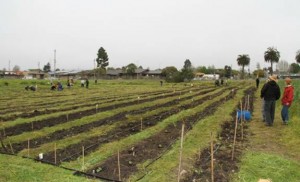
Since Apr 22, dozens of activists have been "occupying the farm" in Albany -- the "farm" being the Gill Tract, a five-acre parcel of land owned by UC Berkeley that it used for agricultural research.
Despite early negotiations, the group is currently in a standoff with the university, though the administration has slowly tightened the noose by cutting off water, blocking entrances and filing a lawsuit.
So...why did Occupy come to the farm in the first place? The group explains in the Why This Farm section on its web site:
We are reclaiming this land to grow healthy food to meet the needs of local communities. We envision a future of food sovereignty, in which our East Bay communities make use of available land - occupying it where necessary - for sustainable agriculture to meet local needs. This particular plot of land is very special:
- These are the last acres of Class One soil left in the urbanized East Bay. Ninety percent of the original land has been paved over and developed, irreverisibly contaminating the land.
- Students, professors, and community have fought for decades to save this amazing land from development and use it for sustainable agriculture.
- UCB capital projects currently administors this land and has slated it for rezoning and redevelopment in 2013 (i.e. supermarkets, parking lots, and apartments).
- The University uses the land to research corn genetics. This research can be conducted anywhere as opposed to this unique site.
“For us the single most important thing is the preservation of the farm for sustainable urban agriculture for the greater East Bay," Occupy the Farm activist Gopal Dayaneni told KQED's Mina Kim this week. "[It's important] that the kids who have been coming here every single day after school have access, that the families that have been coming here on the weekend will have access.”
UC Professor Miguel Altieri, whose research group uses Gill Tract to study sustainable agriculture, has been highly supportive of the group that has taken over the land. In an interview with Albany Patch, he said "I support this action as a private citizen” and said many of the Occupiers are his former students. In an op-ed in The Daily Cal, written with colleague Claudia Carr, he also defended the group's goal of preventing further development of the land, which at one time was 104 acres and is now down to five.
[The group's] goal is to prevent development of this five-acre piece of land that represents one the few remaining agricultural spaces with the best (“class-one”) soil in the East Bay. This effort would allow the community to be engaged with the land, arguing that preserving it as a productive farm is consistent with public policy and the public interest. Such preservation would also honor the history of the Gill Tract, which has housed researchers who, since the 1940s, conducted research on biological pest control, protecting California agriculture from exotic pests without the use of chemical pesticides.
But there are three other researchers who utilize the Gill Tract, and they have spoken out against the occupation. In his interview with Albany Patch, Altieri seemed to brush off their concerns:
Altieri said [the other researchers] could always “go to Davis” to do their work. When told that the corn researchers said the commute to Davis for their five-month field season would be problematic—time-consuming, polluting and prohibitive to student assistants without cars—and that the move would come too late for this year, Altieri dismissed the concerns.
“They have big money,” he said. “Federal and corporate.”
Damon Lisch, who is affiliated with the university's Department of Plant & Microbial Biology, is one of the researchers who is scheduled to set up on the Gill Tract in May. Lisch does genetic research on corn, studying pieces of DNA called transposons that can impact evolution and cause mutations. In an interview on Wednesday, he said "the basic research done on Gill Tract has been extraordinarily productive" in the last few years, "leading to important insights published in journals like Nature Genetics, Nature and Science."